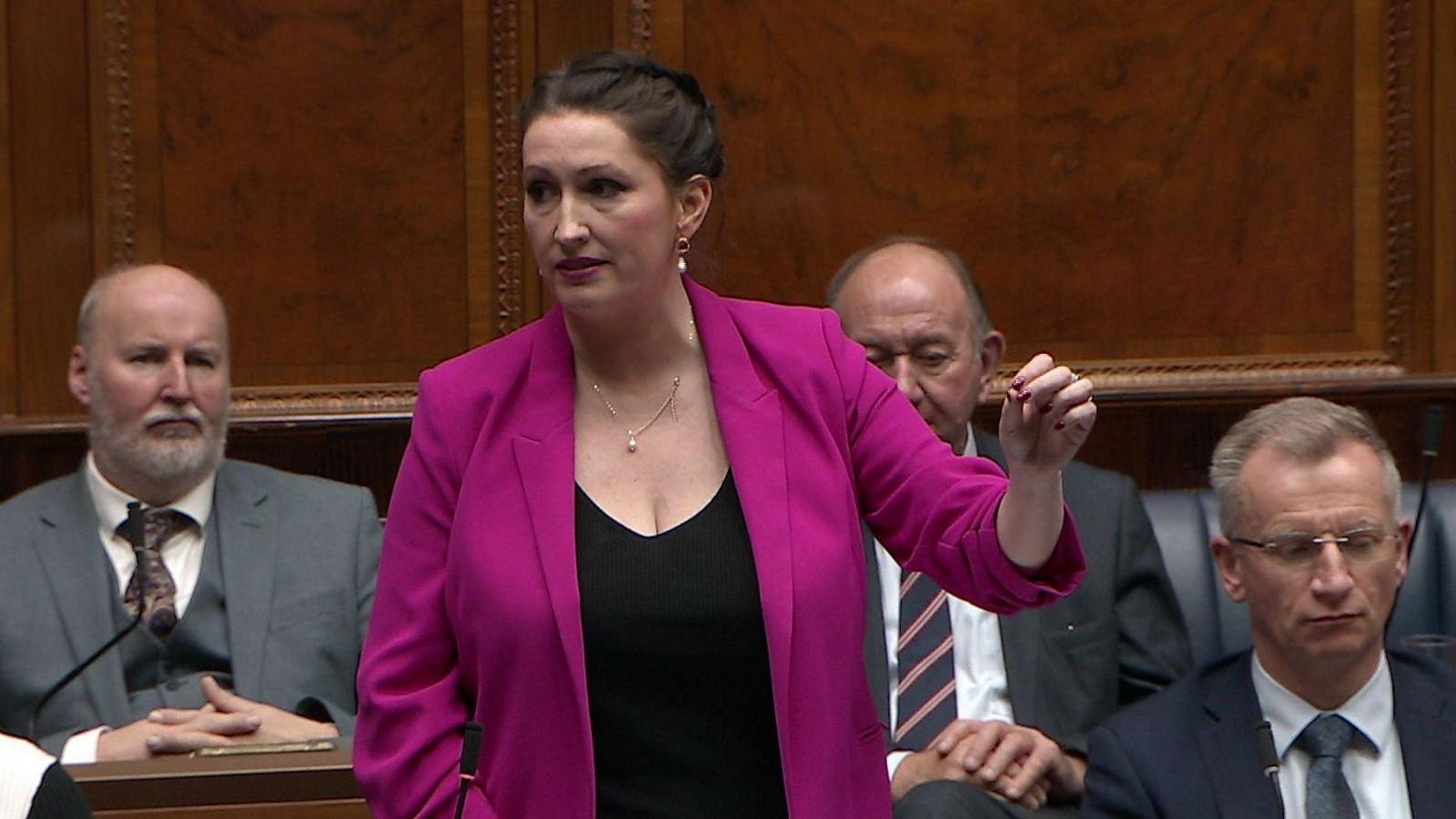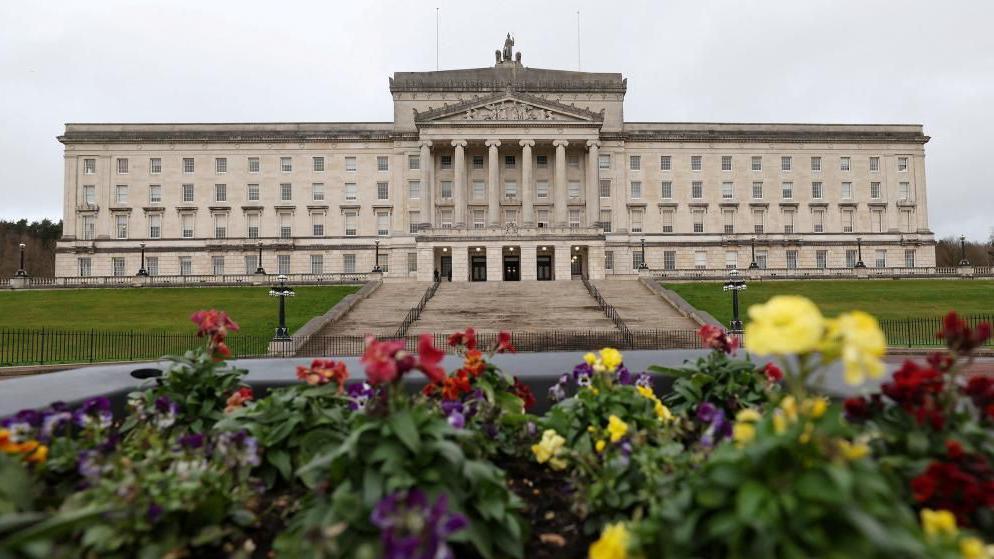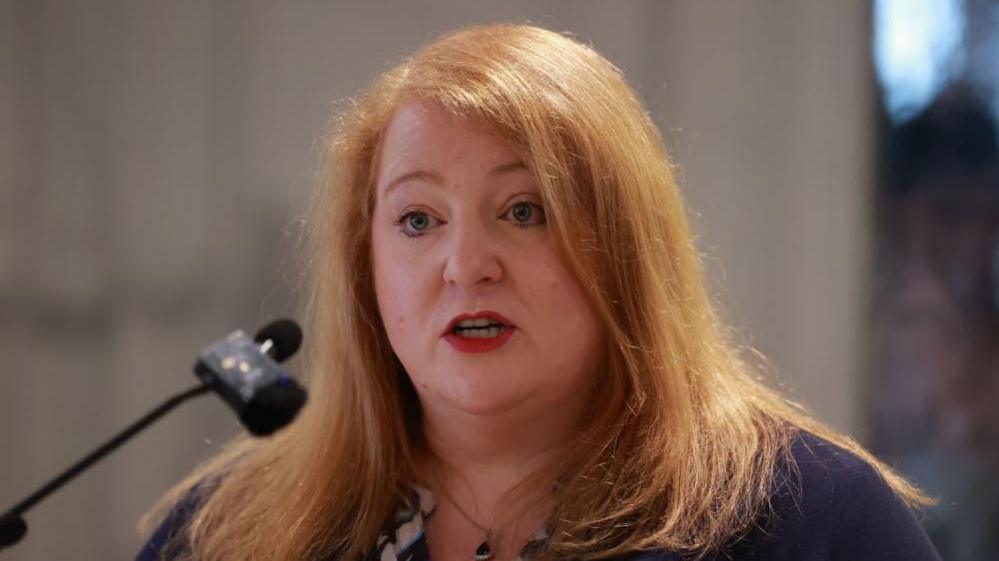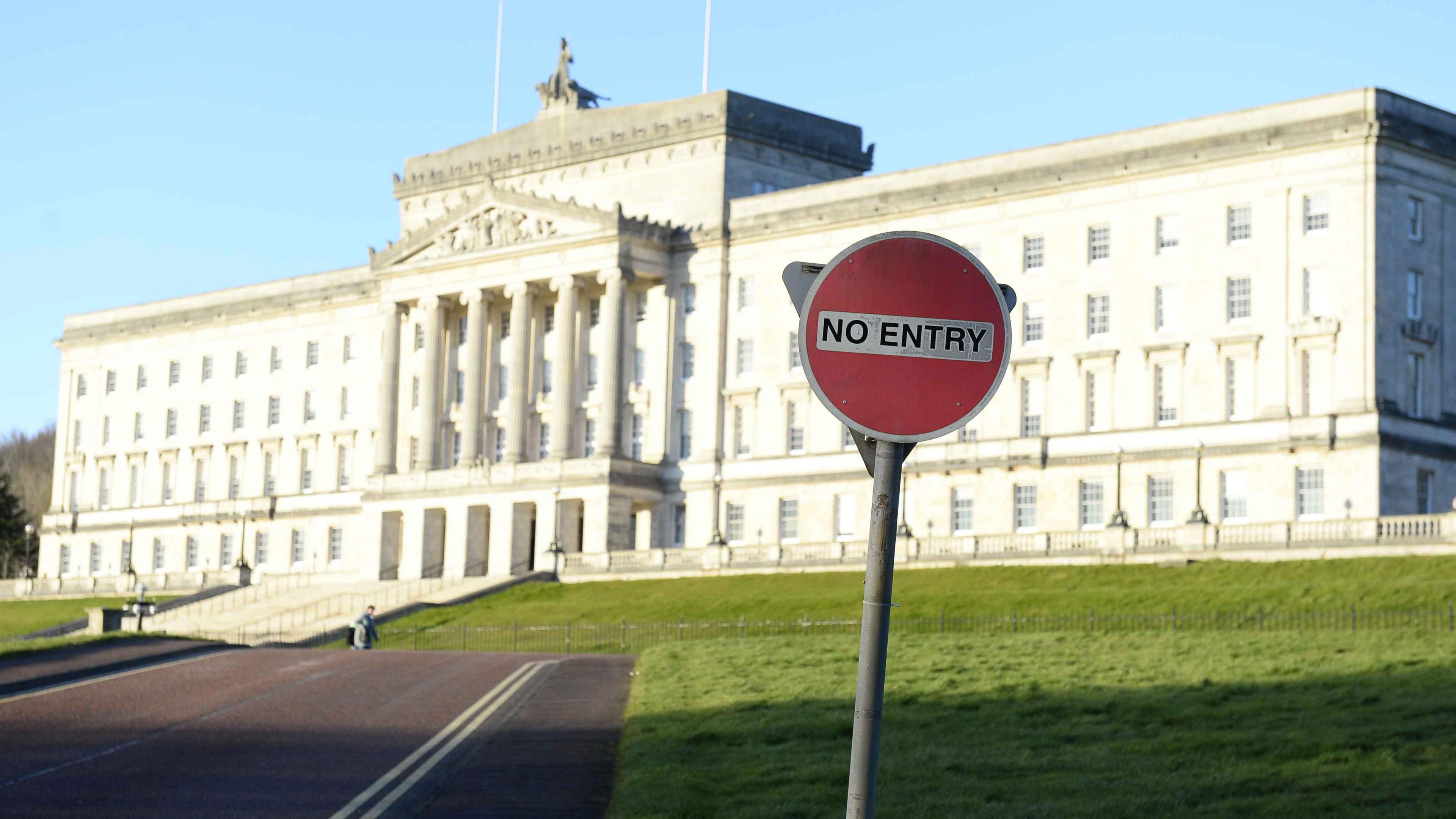Stormont votes to extend post-Brexit trading arrangements

Customs border checks are carried out on trucks leaving and arriving at Larne Port in County Antrim
- Published
Stormont assembly members have voted to continue Northern Ireland's post-Brexit trade arrangements for at least another four years.
The process, known as the democratic consent motion, was first agreed between the UK and EU in the 2020 Withdrawal Agreement to give local politicians a say in the new post-Brexit trading rules.
After a debate lasting six hours in the assembly, the motion passed by 48 to 36 votes.
The arrangement, the Windsor Framework, was agreed between the UK and EU in 2023 and effectively keeps Northern Ireland inside the EU's single market for goods.
The three unionist parties opposed extending the arrangements while Sinn Féin, Alliance and the Social Democratic and Labour Party (SDLP) were among those who voted in favour.
Controversially, unlike other votes at Stormont, there was no requirement for cross-community support for the motion. A simple majority was enough.
The motion was tabled jointly by Sinn Féin, Alliance and the SDLP.
The Democratic Unionist Party (DUP) and other unionist parties argued the vote created a democratic deficit as the concerns of unionists, who are in the minority at Stormont, could be ignored.
The Secretary of State for Northern Ireland, Hilary Benn, said the vote at Stormont marked an "important step forward" for the Windsor Framework trading arrangements.
"This democratic safeguard has provided the elected representatives of the people of Northern Ireland with a say over the trading arrangements that will apply over the next four years.
"I will now proceed as required by the law, including to commission an independent review.
"The government remains committed to implementing the Windsor Framework in good faith and protecting the UK internal market, in a way that offers stability and works for Northern Ireland, for businesses, and for traders."
'A rigged vote'

Deputy First Minister Emma Little-Pengelly said the vote "tears asunder" the cross-community principles of the Good Friday Agreement
During the debate, Deputy First Minister Emma Little-Pengelly, of the DUP, said the vote "tears asunder" the cross-community principles of the 1998 Good Friday Agreement.
She said the Windsor Framework was "causing serious issues" which were "ideological, constitutional and in relation to the practical trade implications".
"What we are dealing with today leads directly from Boris's botched Brexit deal - and it isn't working," she added.
Criticising the lack of a cross-community vote, she said: "This is the first and only key decision that this house will be voting on that absolutely tears asunder the key values and principles that other parties in this chamber championed around the Belfast/Good Friday Agreement."
She added: "It's only consensus and inclusion if it is a matter that is important to you, but not if it's a matter that's important to unionism. It is absolutely appalling.
"This quite frankly is a rigged vote."
Sinn Féin assembly member Philip McGuigan said the Northern Ireland Protocol and subsequent agreements protected businesses from "Brexit's worst excesses".
"These are the hard-fought and hard-won protections that absolutely need to continue and that we are voting for today," he said.
McGuigan, chair of Stormont's Windsor Framework democratic scrutiny committee, said the post-Brexit arrangements offered "certainty and stability".
"Are there issues? Of course there are - this isn't perfect. However, the protocol at least mitigates against the worst excesses of Brexit," he added.
DUP assembly member Jonathan Buckley said the vote was "an illusion of democracy".
"A rigged vote, which the European Union already know the outcome of," he told the assembly.

Several parties at Stormont tabled a motion to the assembly
Buckley said the NI Protocol had "destabilised Northern Ireland's political landscape, fuelled division and shattered trust" and the "rigged nature of today's vote is evidence of that".
"Never has there been a more clear example of a zombie assembly than today," he added.
"Members will vote on giving the authority for the EU parliament to take control of over 300 areas of law, allow them to decide the regulations by which our businesses and consumers will operate by."
Assembly member Kellie Armstrong of the Alliance Party, which does not designate as either nationalist or unionist in the assembly, welcomed the vote, which will be decided by a simple majority.
Her party leader Naomi Long said the Windsor Framework was "the only game in town".
She told the assembly it was "simply not possible to entirely square the circle of the challenges and contradictions posed by Brexit".
But she said that "if we rebuild trust and apply creativity, I believe we can and must lessen the impact".
"While the Windsor Framework is far from perfect, it clearly provides for that softer landing that we need," she said.

Alliance Party leader Naomi Long supports the framework
Ulster Unionist Party (UUP) assembly member Steve Aiken said Northern Ireland's post-Brexit arrangements were not the "best of both worlds" which some had argued.
"We delude ourselves by pretending that we somehow are in a uniquely positive position," he said.
Aiken added: "An accumulation of changes are making us increasingly diverge from our largest market - our own nation."
He said Northern Ireland was being "increasingly sucked into a morass of excessive legislation and rules".
The former UUP leader said all assembly members should be voting to reject the articles of the Windsor Framework to "categorically say that we want to be heard, and have a say on the laws that affect us".

The SDLP's Matthew O'Toole said Northern Ireland has a "unique relationship with the EU"
SDLP assembly member Matthew O'Toole, leader of the opposition in the assembly, said Northern Ireland's trade arrangements had offered some protection from the "disaster" of Brexit.
He said leaving the European Union had "fundamentally damaged the UK economy" but that "Northern Ireland has had some protections from Brexit".
O'Toole told the assembly there were "challenges" from the Northern Ireland Protocol which "need to be worked on".
But he said the deal between the UK government and European Union was "necessary because of Brexit, because of a hard Brexit chosen by people who did not have the interests of this place at heart".
"And tragically the DUP and others in this chamber got on board with that and cheerleaded it," he added.
"And I'm afraid they have no one to blame but themselves in many ways."

Loyalist activist Jamie Bryson's legal action against the vote was dismissed by the High Court on Monday evening
On Monday, loyalist activist Jamie Bryson's legal action against the Stormont vote was dismissed by the High Court.
Mr Bryson claimed Secretary of State Hilary Benn had acted unlawfully by initiating the democratic consent process to maintain the Windsor Framework for another four years.
But a judge refused to grant leave to seek a judicial review after declaring the challenge "untenable".
Mr Justice McAlinden said: "There is no arguable case with a reasonable prospect of success."
What is the Windsor Framework?
In 2023 the Northern Ireland Protocol became the Windsor Framework.
It means that goods traded across the border with the Republic of Ireland, an EU country, has remained undisturbed by Brexit.
The flipside is that goods arriving from elsewhere in the UK are subject to controls and checks—what is known as the Irish Sea border.
For the EU, the new framework left the basic architecture of 2019's protocol intact, creating a trade border between Great Britain and Northern Ireland to prevent a hard land border between Northern Ireland and the Republic of Ireland.
- Published3 December 2024

- Published2 December 2024

- Published31 October 2024
